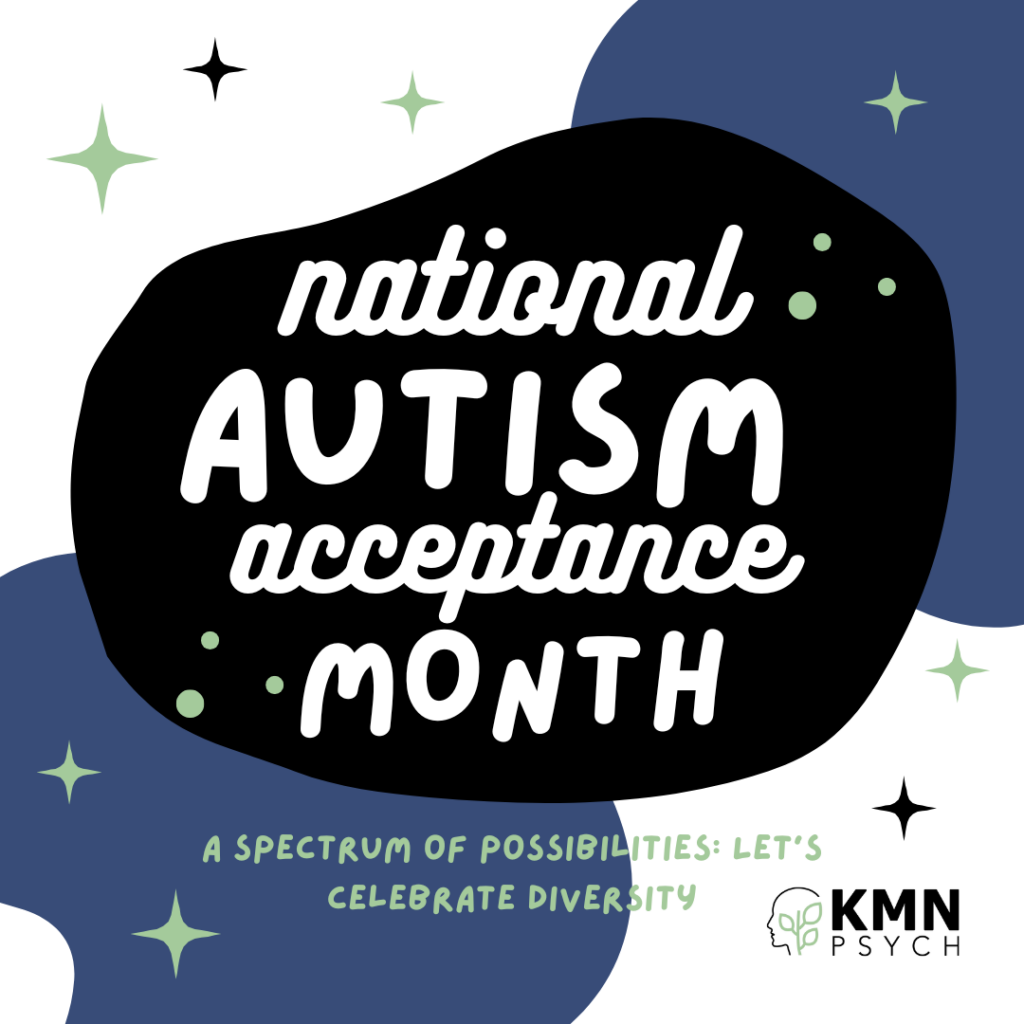This April—National Autism Acceptance Month—is the perfect time to seek answers about your child’s development. With autism affecting 1 in 31 children in the United States, early diagnosis opens doors to life-changing support.

At KMN Psych in San Diego, we provide specialized autism testing for children aged 7 and older. Our comprehensive evaluations deliver the clarity families need to move forward with confidence. This guide will walk you through the autism testing process, from recognizing early signs to understanding what happens during an evaluation with our experts.
Learn More About Pediatric Testing
Understanding Autism Spectrum Disorder in Children

Autism Spectrum Disorder is a neurodevelopmental condition characterized by differences in social communication, behavior patterns, and sensory processing. The term “spectrum” acknowledges the wide range of symptoms, skills, and support needs that individuals with autism may have.
Research shows that early intervention can significantly improve outcomes for children with autism. Studies have demonstrated that children receiving appropriate interventions before age 4 show more significant gains in cognitive abilities, language skills, and adaptive behaviors than those with later treatment.
Common Signs and Symptoms of Autism in Children
The manifestation of autism varies widely among children, with symptoms typically appearing in early childhood. Recognizing potential signs across different age groups can help parents determine when an evaluation might be needed:
In Babies and Toddlers (0-2 years):
- Limited or absent eye contact during interactions
- No response to name by 12 months despite normal hearing
- Absence of pointing to objects of interest by 14 months
- No meaningful two-word phrases by 24 months (beyond simple repetition)
- Loss of previously acquired language or social skills
- Repetitive movements such as hand-flapping, body rocking, or spinning
- Unusual sensory reactions (oversensitivity or undersensitivity)
- Preference for solitary play with limited social engagement
In Preschool Children (3-5 years):
- Difficulty engaging in reciprocal conversation
- Limited or unusual facial expressions
- Literal interpretation of language with difficulty understanding humor or figurative speech
- Intense focus on specific topics or objects
- Rigid adherence to routines with significant distress when routines change
- Unusual speech patterns, tone, or rhythm
- Challenges in imaginative or pretend play
- Difficulty interpreting the emotions or perspectives of others
In School-Age Children (6+ years):
- Challenges in forming and maintaining peer relationships
- Difficulty with social rules that other children seem to learn naturally
- Problems with group activities or collaborative play
- Unusually formal or pedantic speech patterns
- Above-average abilities in specific areas contrasted with difficulties in others
- Sensory processing differences impacting classroom participation
- Challenges with transitions or unexpected changes
- Difficulty with higher-level social communication (reading between the lines)
It’s important to remember that many neurotypical children occasionally display some of these behaviors without having autism. The key difference is these traits’ persistence, combination, and intensity over time.
When to Consider Autism Testing for Your Child

Determining when to pursue autism testing is a common question for parents. While no single “perfect” age for evaluation exists, research consistently shows that earlier intervention leads to better developmental outcomes.
1. Your Child Is Developing Differently Than Expected
The American Academy of Pediatrics recommends formal autism screenings during all children’s 18-month and 24-month pediatric visits. However, if you notice developmental differences between these scheduled visits, seeking evaluation sooner rather than waiting is generally better. Autism indicators can be detected in children as young as 12-18 months by trained professionals.
2. Your Child Is Struggling in School
School entry often highlights previously unrecognized social or behavioral differences as classroom demands increase. If your child has difficulty with classroom routines, peer interactions, or academic performance despite adequate cognitive abilities, a comprehensive assessment can provide valuable insights, even for older children who may have developed compensation strategies.
3. You’ve Noticed Concerning Changes in Skills
Any noticeable slowing, stopping, or loss of previously acquired skills warrants professional evaluation, particularly in communication or social domains. These developmental regressions can be important indicators that require prompt assessment.
4. A Teacher or Doctor Has Recommended Evaluation
When educators, physicians, or childcare providers recommend assessment, their observations deserve serious consideration. These professionals typically have extensive experience with typical child development and can often identify subtle differences that may not be immediately apparent at home.
5. Your Parental Instincts Tell You Something’s Different
Parents often detect developmental differences before professionals. Trust your instincts if you have persistent concerns about your child’s development, even when others suggest waiting. Early assessment eliminates unnecessary delays and can provide access to intervention during critical developmental windows.
The Autism Testing Process: What to Expect
Understanding the typical process for autism evaluation can help families prepare and reduce anxiety about the assessment journey.
1. Initial Screening and Referral
Most families begin with developmental screening through their pediatrician. These standardized screenings serve as initial filters to identify children who may benefit from a comprehensive assessment. Based on screening results, your doctor may:
- Determine that development appears within typical parameters
- Recommend targeted monitoring of specific developmental domains
- Provide a referral for a comprehensive neuropsychological evaluation
At KMN Psych, families can contact us directly for evaluation services, whether they have a referral or not.
2. Finding the Right Evaluation Provider
Selecting the right assessment provider significantly impacts diagnostic accuracy. When looking for an evaluation service, consider professionals with:
- Specialized training in neurodevelopmental disorders
- Experience with autism spectrum disorders across different age groups
- The capability to perform differential diagnosis for similar conditions
- Child-friendly assessment approaches
Learn More About Child Testing at KMN
3. The Comprehensive Evaluation Process
A thorough autism evaluation typically involves multiple components:
- Initial Parent Interview: The assessment begins with gathering detailed information about your child’s developmental history, current concerns, and functioning across different environments.
- Child Assessment: Through structured activities and natural observation, clinicians evaluate your child’s social communication, play skills, cognitive abilities, and behavioral patterns.
- Standardized Testing: Various assessment tools measure specific development, behavior, and functioning aspects to provide objective data about your child’s profile.
At KMN Psych, each child receives an individualized combination of assessments based on their specific needs, existing conditions, and the goals for testing.
4. After the Assessment
Following the evaluation:
- Report Development: Assessment information is analyzed and compiled into a comprehensive written report with findings and recommendations. KMN Psych provides families a detailed 15-20 page report within 10-14 days.
- Results Discussion: Parents meet with the evaluation team to review findings, diagnosis (if applicable), and recommendations. At KMN Psych, families can meet with Dr. Doshay for a verbal explanation of results.
- Recommendation Planning: Based on the assessment results, you’ll receive guidance for next steps, including therapeutic interventions, educational accommodations, and family support resources.
The Testing Experience: Preparing Your Child

When preparing for an autism evaluation, knowing what to expect can help you and your child feel more comfortable with the process.
Before Your Appointment
Before your child’s evaluation, consider:
- Gathering any previous assessment reports or medical records
- Preparing questions you have about your child’s development
- Explaining to your child in age-appropriate terms what to expect
- Completing any developmental questionnaires received from your provider
Your Evaluation Day
Most autism evaluation centers strive to create a child-friendly environment to reduce anxiety and promote authentic behavior observation. The assessment experience typically includes:
- Welcoming Introduction: Staff will help you and your child feel comfortable and explain the day’s activities.
- Parent Interview: While your child engages with testing materials, clinicians gather detailed information about developmental history and current concerns.
- Child Assessment: Through structured activities and natural observation, professionals evaluate your child’s social communication, play, cognitive abilities, and behavioral patterns.
Testing is generally presented in an engaging, non-threatening manner with breaks as needed to ensure your child’s comfort throughout the process. At KMN Psych, creating a positive testing experience is a priority.
Common Assessment Methods in Autism Evaluation

Comprehensive autism evaluations utilize multiple assessment methods to develop a complete clinical picture of a child’s developmental profile. These may include:
Diagnostic Instruments and Approaches
- Structured Observation: Standardized protocols allow clinicians to systematically evaluate social communication, play behaviors, and repetitive/restricted interest patterns.
- Developmental Interviews: Parent interviews gather detailed information about early development, symptom emergence, and current functioning across multiple environments.
- Cognitive Assessment: Tests like the Wechsler Intelligence Scale for Children help identify cognitive strengths and challenges.
- Adaptive Behavior Evaluation: Tools like the Vineland Adaptive Behavior Scales (VABS) assess practical life skills across communication, socialization, daily living, and motor domains.
Executive Functioning Assessment: Measures like the Behavior Rating Inventory of Executive Function (BRIEF) identify strengths and challenges in areas such as emotional control, working memory, and planning/organization. - Language Evaluation: Standardized measures evaluate structural language skills and pragmatic/social communication abilities.
KMN Psych utilizes many of these evidence-based assessment tools as part of our comprehensive evaluation protocol.
Multiple Data Sources
A thorough assessment approach extends beyond standardized testing to incorporate:
- Observations across different settings, when possible
- Developmental history analysis
- Information from multiple sources (parents, teachers, other providers)
This multi-method assessment approach helps clinicians differentiate autism from other conditions with overlapping symptoms and identify co-occurring conditions that may require additional intervention approaches.
After the Autism Diagnosis: Next Steps for Parents

Receiving an autism diagnosis often triggers a range of emotions for parents. Having a clear roadmap for next steps can help families move forward productively.
Evidence-Based Intervention Options
Research consistently demonstrates that specific intervention approaches initiated early significantly improve developmental trajectories for children with autism. Based on your child’s unique profile, professionals may recommend:
- Applied Behavior Analysis (ABA): Structured behavioral intervention that systematically reinforces positive social communication and reduces challenging behaviors.
Developmental Relationship-Based Interventions: Approaches like DIR/Floortime or Early Start Denver Model that leverage natural play to build social engagement and communication. - Speech-Language Therapy: Targeted interventions addressing both verbal and non-verbal communication deficits, including pragmatic language skills.
- Occupational Therapy: Specialized therapy addressing sensory processing differences, motor skills, and daily living capabilities.
A comprehensive assessment report, like those provided by KMN Psych, typically specifies which intervention approaches match your child’s developmental profile and learning style.
Educational Support and Accommodations
Detailed neuropsychological reports are essential for securing educational services:
- IEP Documentation: Comprehensive testing results establish eligibility for special education services under autism or other qualifying categories.
- Accommodation Planning: Recommendations for classroom modifications based on your child’s cognitive profile, sensory needs, and learning style.
- Progress Monitoring: Guidelines for tracking educational progress and determining when adjustments to the academic approach may be necessary.
Family Support Systems
The impact of an autism diagnosis extends beyond the diagnosed child to the entire family system. A holistic approach includes:
- Parent Education: Resources for learning effective interaction and teaching strategies specific to your child’s needs.
- Sibling Support: Resources for helping neurotypical siblings understand autism and develop positive relationships.
Caregiver Wellness: Strategies that recognize supporting a child with autism requires sustainable family functioning through respite care and self-care practices. - Community Resources: Connections with local support groups, autism advocacy organizations, and recreational programs for children with developmental differences.
Understanding Insurance Coverage for Autism Evaluation

Navigating the financial aspects of autism assessment is an important practical consideration for many families.
Insurance Options
Most major insurance plans provide coverage for comprehensive neuropsychological evaluations when medically necessary for diagnosing conditions like autism spectrum disorder. When working with your insurance:
- Request a written referral from your child’s pediatrician, specifically recommending a neuropsychological evaluation
- Contact your insurance provider to verify coverage before scheduling
- Ask whether pre-authorization is required
- Understand any limitations on the number of testing hours covered
As part of the screening process, we help clients verify their insurance provider can provide financial assistance. We accept PPO as well as non-insured clients. Let us walk you through the process so you can get tested as soon as possible.
Options Without Insurance Coverage
For families without adequate insurance coverage, many evaluation providers offer alternative payment options:
- Self-pay packages with transparent pricing
- Payment plans to distribute costs over time
- Sliding scale fees based on financial need
- HSA/FSA compatibility
KMN Psych works with both insured and non-insured clients to make testing accessible.
Finding the Right Autism Evaluation Provider

When selecting a provider for your child’s autism evaluation, expertise and approach significantly impact the assessment experience and the accuracy of diagnostic conclusions.
What to Look For in a Provider
- Specialized Expertise: Look for clinicians or facilities, like KMN Psych, with specific training and experience in autism assessment across different age groups.
- Comprehensive Approach: Seek providers who utilize multiple assessment methods rather than relying on a single test or observation.
- Family-Centered Process: Choose evaluators who involve parents throughout the assessment and provide clear, actionable recommendations.
- Clear Communication: Find professionals who explain complex findings in accessible language and provide detailed written reports.
- Timely Results: Consider providers who can deliver comprehensive reports within a reasonable timeframe.
KMN Psych in San Diego offers specialized neuropsychological testing with these professional standards in mind. We are passionate about making comprehensive neuropsychological evaluations simple and accessible for everyone.
Schedule Your Child’s Autism Evaluation This April

April is Autism Acceptance Month—a perfect time to take action if you’ve been concerned about your child’s development. As the world comes together to promote understanding and acceptance of autism, KMN Psych will provide the professional evaluation services your family needs.
Ready to get answers about your child’s development? Our expert team provides comprehensive autism testing with minimal wait times. Call us at (858) 923-4228 or complete our online form to begin the process.
Verify Your Insurance
As part of the screening process at KMN Psych, we help clients verify their insurance provider can provide financial assistance. We accept PPO as well as non-insured clients. Let us walk you through the process so you can get tested as soon as possible.
Frequently Asked Questions About Autism Assessment
How long does an autism evaluation take?
A comprehensive assessment process typically includes:
- An initial parent interview (usually 60-90 minutes)
- Direct assessment with your child (3-4 hours, often divided into multiple sessions for younger children)
- A feedback session to discuss results and recommendations
- Written report preparation (typically delivered within 1-3 weeks)
At what age can autism be reliably diagnosed?
While autism can be reliably diagnosed as early as 18-24 months by experienced clinicians, many children aren’t diagnosed until preschool or early elementary years. Early identification allows for intervention during critical developmental periods, leading to better outcomes.
What’s the difference between an autism screening and a comprehensive evaluation?
A screening is a brief tool pediatricians use to identify children who might benefit from a more thorough assessment. These quick screenings cannot provide a diagnosis. Comprehensive evaluations involve multiple assessment methods, including structured observations, developmental interviews, and standardized testing—the gold standard approach required for formal diagnosis.
Can my child’s pediatrician diagnose autism?
While pediatricians play a crucial role in developmental screening, a formal autism diagnosis typically requires a comprehensive evaluation by specialists with extensive training in autism assessment. Specialized facilities like KMN Psych have the expertise to provide accurate diagnoses and detailed recommendations.
How does a professional evaluation differentiate autism from other conditions?
Comprehensive assessment processes are designed to distinguish autism from conditions with overlapping symptoms. Through detailed history-taking, standardized testing, and direct observation, clinicians can differentiate autism from other conditions like language disorders, ADHD, anxiety disorders, and intellectual disability, ensuring accurate diagnosis and appropriate treatment recommendations.
References
1. Shaw KA, Williams S, Patrick ME, et al. Prevalence and Early Identification of Autism Spectrum Disorder Among Children Aged 4 and 8 Years — Autism and Developmental Disabilities Monitoring Network, 16 Sites, United States, 2022. MMWR Surveill Summ 2025;74(No. SS-2):1–22. DOI: http://dx.doi.org/10.15585/mmwr.ss7402a1
2. Autism Speaks. (2009, November 30). Early intervention for toddlers with autism highly effective, study finds. Retrieved April 16, 2025, from https://www.autismspeaks.org/science-news/early-intervention-toddlers-autism-highly-effective-study-finds
3. Webb, S. J., & Jones, E. J. (2009). Early Identification of Autism: Early Characteristics, Onset of Symptoms, and Diagnostic Stability. Infants and young children, 22(2), 100–118. https://doi.org/10.1097/IYC.0b013e3181a02f7f
4. Maksimović, S., Marisavljević, M., Stanojević, N., Ćirović, M., Punišić, S., Adamović, T., Đorđević, J., Krgović, I., & Subotić, M. (2023). Importance of Early Intervention in Reducing Autistic Symptoms and Speech-Language Deficits in Children with Autism Spectrum Disorder. Children (Basel, Switzerland), 10(1), 122. https://doi.org/10.3390/children10010122
5. American Academy of Pediatrics. (n.d.). Autism spectrum disorder. Retrieved April 16, 2025, from https://www.aap.org/en/patient-care/autism/
